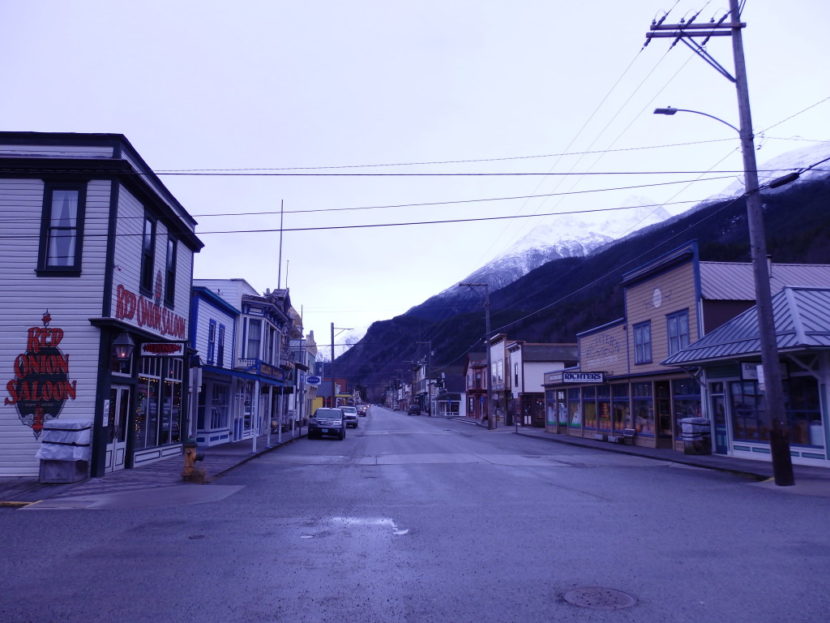
This month, the Skagway Planning and Zoning Commission denied a local business owner’s request for a marijuana retail store. The conditional use permit was denied not based on local zoning code, but on state law.
Skagway is a small community squeezed into a steep and narrow valley. That means many of the town’s businesses are condensed into an even smaller area. By state law, marijuana businesses cannot be within 500 ft. of a school ground, a recreation or youth center, a building where religious services are regularly conducted, or a correctional facility.
“There’s a very small area in Skagway where these shops can be permitted by state code,” said Deach. “It’s a pretty small window.”
That’s Planning and Zoning Chair Matt Deach at the Nov. 10 meeting. The commission was reviewing an application for a conditional use permit to operate a retail marijuana business. The application was submitted by Kristine Harder. She’s the owner of Buckshot and Bobbypins, which recently moved to 750 Broadway.
Her plan was to sell cannabis products in addition to the wide variety of items she already stocks.
“It was never my intention to just turn into a 100 percent cannabis retail store,” said Harder.
She says based on a map Skagway’s previous permitting official provided that showed where pot shops are allowed and her review of state and municipal code she should be in the clear to do that. And, she says she wouldn’t have moved locations if she believed it would be an issue.
Harder’s store is located in Skagway’s Business Historic zone. By municipal zoning code, pot shops are not prohibited there, but you need to obtain a conditional use permit. There are four criteria for that, but that wasn’t really the issue for the commission.
In May, they granted a conditional use permit to Skagway business owner Tara Bass for her marijuana retail shop in the Business General zone. And Deach says there is no bad attitude toward pot shops.
“We’ve always looked at them the same as any other retail business as permitted by the state,” said Deach. “There’s no animus coming from our particular corner of the local government towards it.”
What it really came down to was the state buffer zone regulations. Deach argued that Harder’s business is too close to daycares, a church, library, and Mollie Walsh Park.
There was some confusion around the wording used in the law. Harder contends “recreation or youth center” would discount daycares, especially since the wording changed from the original “child care facility.” Going by the state definition of that phrase, Deach disagreed.
“I would absolutely classify them as a place for youth, as well as Mollie Walsh Park,” said Deach.
Harder questioned whether it’s even in the local government’s jurisdiction to make judgment on the state law. Deach said yes.
“We cannot be less permissive then state code as a city entity,” said Deach. “We always have to uphold state code, whatever the strictest code is, state, federal, we have to uphold the strictest version we cannot be less restrictive.”
“Well I wouldn’t have applied if I hadn’t dotted my i’s and crossed my t’s and I’ve got everything marked in the law here,” said Harder.
TRACK: According to Cynthia Franklin, Director of the State’s Alcohol and Marijuana Control Office, local governments have the right to protest an application based on state regulations. But whether the Planning and Zoning Commission has that power is a question she deferred to the borough attorney.
Deach said they did consult the attorney.
“His response to whether or not P&Z should take state law into account was I think it is more important to look at whether the location satisfies all applicable laws,” said Deach. “If it does not satisfy state law then that seems to me a proper consideration from planning and zoning.”
He said they could turn the judgment over to the state.
“We can easily pass the buck onto the state,” said Harder. “I prefer to keep stuff in house as much as possible.”
Ultimately, the commission voted unanimously to deny the conditional use permit. Harder said this is an example of the difficulty business owners face in small communities like Skagway.
“There are a lot of other smaller coastal communities who feel that the statutes are currently not fair and equitable for people living in coastal communities with less land mass in Southeast Alaska,” said Harder.
And, she says it all comes down to the over-regulation of cannabis, compared to alcohol, when bars are allowed in that same area, but not her business.
Harder can appeal the decision to the borough assembly. She has not said whether she will follow that recourse.
